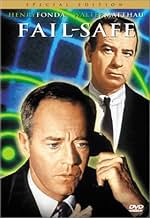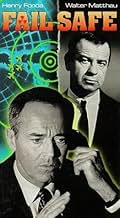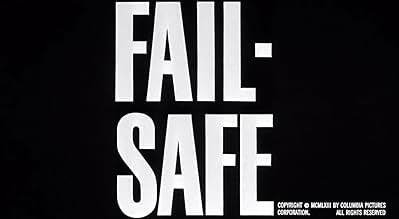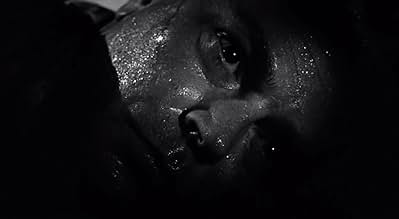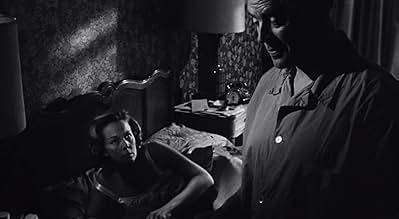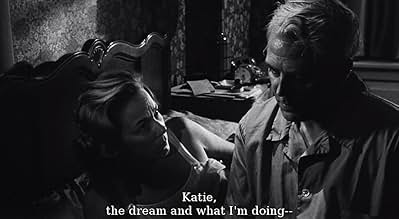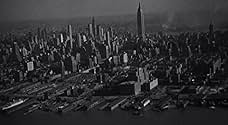Une défaillance technique envoie des avions américains à Moscou pour lancer une attaque nucléaire. Une guerre totale peut-elle être évitée?Une défaillance technique envoie des avions américains à Moscou pour lancer une attaque nucléaire. Une guerre totale peut-elle être évitée?Une défaillance technique envoie des avions américains à Moscou pour lancer une attaque nucléaire. Une guerre totale peut-elle être évitée?
- Réalisation
- Scénario
- Casting principal
- Nomination aux 1 BAFTA Award
- 3 nominations au total
Dom DeLuise
- Sgt. Collins
- (as Dom DeLouise)
Avis à la une
22 January 2010. Even in black and white, this edgy, raw and gripping nuclear apocalyptic thriller retains is powerful and emotional message even after 46 years. Even though some of the equipment is dated in this movie, the serious and almost seemingly electronic starkness is able to project a impressive, compelling impression of sophistication that maintains a level of captivating images that breath intelligence and innovation of government operations even years ago. The acting and substance of this thriller contains a constant level of tension, off-balance conflict that hits home even today. While almost deviating, particularly in the beginning to the dated acting dramatics of the 60s, this movie successful keeps its attention on seemingly realistic and heightened elements of military and political strategy, operations and equipment, tactics that all fit well together making the entire movie a unified and seamless experience in accidental tragedy. 9/10.
I mentioned in another comment about a series of movies made during the mid-1960's, that I call 'political noir'.
These films are easy to spot, in that there were made in B&W, dealt with a American institutional crisis and seemed to always feature Henry Fonda somewhere in the cast.
On all three counts, this film fits that criteria.
Because this film came out around the time of "Dr Strangelove", it was somewhat overshadowed, and because of the nearly identical plots, there was even talk of plagiarism, even though this film was based on a novel by two Washington-based journalists with a remarkable insight of the workings of government and was directed by Sidney Lument, one of the cinema's great directors.
Also, unlike "Dr Strangelove", which seemed to receive major studio backing, money and the freedom offered by being produced in Great Britain where this satire was more appreciated, "Fail-Safe" was independently produced in New York on a limited budget, without official backing by the Defense Department, which explains all of the flaws complained of by many viewers and posters on this site.
Yet in spite of these limitations, Lument pulls off a major coup by presenting us with an authentic piece of Armeggeddon.
In a real-time view, we watch as a million-to-one technical fault 'orders' a wing of American bombers to attack Soviet Russia, and the Defense Department and the President are helpless in trying to stop it.
We are also witness to how our military operates, trying to plan military policy, and debating theory and possible results.
Such things are sensible and harmless as far as these things go, until 'the day comes' when reality displaces theory.
Walter Matthau, who is more well-known for his comic talents ("The Odd Couple", "Grumpy Old Men"), than being an accomplished dramatic actor, is shown at the height of his powers as Prof. Groteschelle; a defense policy wonk, whose obsession with defense preparedness and Marxist theory reaches the point of detachment from human emotion, as he blindly recommends that no action be taken and the bombers be allowed to complete their mission, resulting in 'final victory' over Communism.
This is in direct contradiction to General Black, a compassionate Air Force officer who is also an intellectual, who desperately urges that every means be made to stop the bombers before it is too late.
However, it turns out to be too late, at least on the American side.
We watch how technology becomes a hindrance, as much as the distrust between the two superpowers seems to be, as the President and the Soviet Premier desperately try to seek a solution to this disaster.
The tragedy about this is that someone thought they should remake this in 2000, which in a way is flattering but certainly could not come close to the original work.
But, this only proves that the subject of 'accidental war' is still a concern.
However, how can one do better than Henry Fonda ???
These films are easy to spot, in that there were made in B&W, dealt with a American institutional crisis and seemed to always feature Henry Fonda somewhere in the cast.
On all three counts, this film fits that criteria.
Because this film came out around the time of "Dr Strangelove", it was somewhat overshadowed, and because of the nearly identical plots, there was even talk of plagiarism, even though this film was based on a novel by two Washington-based journalists with a remarkable insight of the workings of government and was directed by Sidney Lument, one of the cinema's great directors.
Also, unlike "Dr Strangelove", which seemed to receive major studio backing, money and the freedom offered by being produced in Great Britain where this satire was more appreciated, "Fail-Safe" was independently produced in New York on a limited budget, without official backing by the Defense Department, which explains all of the flaws complained of by many viewers and posters on this site.
Yet in spite of these limitations, Lument pulls off a major coup by presenting us with an authentic piece of Armeggeddon.
In a real-time view, we watch as a million-to-one technical fault 'orders' a wing of American bombers to attack Soviet Russia, and the Defense Department and the President are helpless in trying to stop it.
We are also witness to how our military operates, trying to plan military policy, and debating theory and possible results.
Such things are sensible and harmless as far as these things go, until 'the day comes' when reality displaces theory.
Walter Matthau, who is more well-known for his comic talents ("The Odd Couple", "Grumpy Old Men"), than being an accomplished dramatic actor, is shown at the height of his powers as Prof. Groteschelle; a defense policy wonk, whose obsession with defense preparedness and Marxist theory reaches the point of detachment from human emotion, as he blindly recommends that no action be taken and the bombers be allowed to complete their mission, resulting in 'final victory' over Communism.
This is in direct contradiction to General Black, a compassionate Air Force officer who is also an intellectual, who desperately urges that every means be made to stop the bombers before it is too late.
However, it turns out to be too late, at least on the American side.
We watch how technology becomes a hindrance, as much as the distrust between the two superpowers seems to be, as the President and the Soviet Premier desperately try to seek a solution to this disaster.
The tragedy about this is that someone thought they should remake this in 2000, which in a way is flattering but certainly could not come close to the original work.
But, this only proves that the subject of 'accidental war' is still a concern.
However, how can one do better than Henry Fonda ???
I saw this movie via two instances of serendipity. First I just happened to be living in an area that offered The Disney Channel in the basic cable package (which is all I ever get) and that as a Bruce Springsteen fan I was excited that the Disney Channel was going to broadcast a special concert short on The Boss. Of course I'm an older Springsteen fan, so instead of staying up late to watch it I just put a tape in and pressed record. The next day I enjoyed the concert, but forgot to hit stop when it ended. What followed next was "Fail Safe". After a few minutes it caught my interest, and now is one of my favorite films.
I'm not sure if this was a precursor to "Strangelove" or vice versa, for they are both listed as 1964 releases. Oddly they both have the same texture about them which leads me to believe that there was more than coincidence in their respective productions. Both are piece de resistances in Cold War studies. The main sundering is that where "Strangelove" excels in parody, "Fail Safe" is rich in tension.
Of course an anxious film about nuclear war on the brink can easily invoke tension (remember "War Games"?), but this film exceeds a good plot. The filmmakers use a backdrop of soceital depravity to create neurasthenia and presentiment; as shown by the strange and erotic scene with Walter Matthau and the woman in the car (kind of a mass-sadisim, lust thing) and the implied domestic violence in the apartment scene. The movie is also deliciously philosophical (the clever "criminals and file clerks will survive" theory) as well as adroit phsycological character development for all the main characters.
The picture is also darkly filmed, remarkedly minimalist and low-budget as if to show the limits of technology, in order to symbolize the sophistry of our trust in it. BTW I love the Matthau character's (the political science professor) line as he explains the faults of missles that have no human intuition. "The rockets have the defect of their virtues" he says in explaining how they cannot make a conscious decision to abort after receiving an order. But the message in this film is clear; even if technology breaks down it is only a symptom of our doom, ultimately it is humans who are responsible.
I'm not sure if this was a precursor to "Strangelove" or vice versa, for they are both listed as 1964 releases. Oddly they both have the same texture about them which leads me to believe that there was more than coincidence in their respective productions. Both are piece de resistances in Cold War studies. The main sundering is that where "Strangelove" excels in parody, "Fail Safe" is rich in tension.
Of course an anxious film about nuclear war on the brink can easily invoke tension (remember "War Games"?), but this film exceeds a good plot. The filmmakers use a backdrop of soceital depravity to create neurasthenia and presentiment; as shown by the strange and erotic scene with Walter Matthau and the woman in the car (kind of a mass-sadisim, lust thing) and the implied domestic violence in the apartment scene. The movie is also deliciously philosophical (the clever "criminals and file clerks will survive" theory) as well as adroit phsycological character development for all the main characters.
The picture is also darkly filmed, remarkedly minimalist and low-budget as if to show the limits of technology, in order to symbolize the sophistry of our trust in it. BTW I love the Matthau character's (the political science professor) line as he explains the faults of missles that have no human intuition. "The rockets have the defect of their virtues" he says in explaining how they cannot make a conscious decision to abort after receiving an order. But the message in this film is clear; even if technology breaks down it is only a symptom of our doom, ultimately it is humans who are responsible.
See "Fail- Safe."
I couldn't sleep without the light on after I saw this fantastically fabricated film. When a machine malfunctions and signals a U.S bomber to drop atomic missiles over Moscow, the Soviet Premier and the U.S President struggle to save the world from nuclear holocaust. The last three minutes are among the most powerful I've seen in a movie.
I couldn't sleep without the light on after I saw this fantastically fabricated film. When a machine malfunctions and signals a U.S bomber to drop atomic missiles over Moscow, the Soviet Premier and the U.S President struggle to save the world from nuclear holocaust. The last three minutes are among the most powerful I've seen in a movie.
I was thoroughly in suspense throughout this magnificent film. I almost felt as if I was watching World War III unfurl like the Gulf War did on CNN, it was that convincing. Fonda as the President and Matthau as the Professor, in truly memorable performances, are superb in their roles and indeed the entire cast is strongly competent. Besides the unforgettable ending, by way of the President's unthinkable concession, are the arguments and attitudes of the Professor and Colonel Cascio. At the time it must have been very tempting to many hawks in Cold War administrations to end the deadlock whenever a seemingly decisive opening presented itself. I strongly recommend this film for its believablity and realism and even the final credits! 10/10.
Le saviez-vous
- AnecdotesThe "computer-generated" image on the control-room screen (including the map of the world, the planes and the explosions) was entirely drawn and animated by hand.
- GaffesThe end credits list General Black's wife as Betty, but in the film he addresses her as Katie and in a radio conversation, the President asks Black, "Are Kathryn and the kids in New York?"
- Citations
US Ambassador: [over the phone] I can hear the sound of explosions from the north east. The sky is very bright. All lit up.
[phone melts and high pitched whining sound starts]
- Crédits fous[FINAL CREDIT]: The producers of this film wish to stress that it is the stated position of the Department of Defense and the United States Air Force that a rigidly enforced system of safeguards and controls insure that occurrences such as those depicted in this story cannot happen
- ConnexionsFeatured in Henry Fonda: The Man and His Movies (1982)
Meilleurs choix
Connectez-vous pour évaluer et suivre la liste de favoris afin de recevoir des recommandations personnalisées
- How long is Fail Safe?Alimenté par Alexa
- What is this movie's connection to Dr. Strangelove?
Détails
- Date de sortie
- Pays d’origine
- Langues
- Aussi connu sous le nom de
- Límite de seguridad
- Lieux de tournage
- Westbury, Long Island, New York, États-Unis(Roosevelt Field: President's bunker)
- Société de production
- Voir plus de crédits d'entreprise sur IMDbPro
Box-office
- Montant brut aux États-Unis et au Canada
- 3 924 000 $US
- Durée1 heure 52 minutes
- Couleur
- Rapport de forme
- 1.85 : 1
Contribuer à cette page
Suggérer une modification ou ajouter du contenu manquant


![Regarder Trailer [OV]](https://m.media-amazon.com/images/M/MV5BZjExYTg4YzctNGIwZC00ZWUwLWFhOWItNTJhYjRiY2UzZjk4XkEyXkFqcGdeQXRyYW5zY29kZS13b3JrZmxvdw@@._V1_QL75_UX500_CR0)
